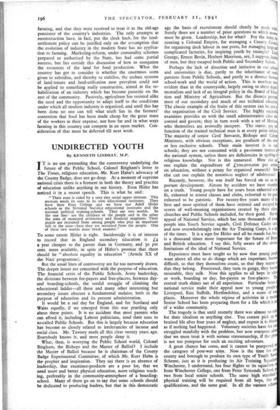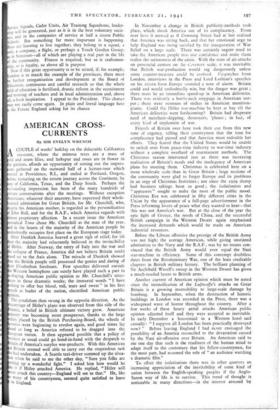UNDIRECTED YOUTH
By KENNETH LINDSAY, M.P.
IT is no use pretending that the controversy underlying the 1 future of the Public School, Colonel Bingham's letter to The Times, religious education, Mr. Kurt Hahn's advocacy of the County Badge, does not go deep. At a moment of supreme national crisis there is a ferment in both the theory and practice of education unlike anything in our history. Even Hitler has noticed it in a recent speech. This is what he said:
" Their state is ruled by a very tiny social upper stratum. This stratum sends its sons to its own educational institutes. They have their Eton College and we have our Adolf Hitler schools or the National Socialist educational institutes and the national political training-schools. They are two worlds. In the one ther. are the children of the people and in the other the sons of moneyed aristocracy and financial magnates. Their pupils are recruited from among people who play an important role in the state—here they are recruited from the people. One of these two worlds must break asunder."
To some extent Hitler is right. Incidentally it is of interest to record that in England secondary education is £4 a year cheaper to the parent than in Germany, and 3o per cent. more available, in spite of Hitler's promise that there should be " absolute equality in education (Article XX of the Nazi programme).
But the usual lines of controversy are far too narrowly drawn. The deeper issues are concerned with the purpose of education. The financial crisis of the Public Schools, Army leadership, the divisions between fee-payers and free-placers, between day- and boarding-schools, the sordid struggle of climbing the educational ladder—all these and many other interesting but secondary issues obscure a fundamental malaise, both in the purpose of education and its present administration.
It would be a sad day for England, and for Scotland and Wales equally, if we emerged from this war prattling only about these points. It is no accident that most parents who can afford it, including Labour politicians, send their sons to so-called Public Schools. But this is largely because education has become so closely related to irrelevancies of income and social class. Mr. Tawney made all this clear twenty years ago. Everybody knows it, and most people deny it.
What, then, is worrying the Public School world, Colonel Bingham, the Bishops and the Master of Balliol? I include the Master of Balliol because he is chairman. of the County Badge Experimental Committee, of which Mr. Kurt Hahn is the prophet and inspiration. They say there is an absence of leadership, that examinee-products are a poor lot, that we need more and better physical education, more religious teach- ing, preferably in the community-atmosphere of a boarding- school. Many of them go on to say that some schools should be dedicated to producing leaders, but that in this democratic age the basis of recruitment should clearly be made aide[ Surely there are a number of prior questions to which ansivt4 must be given. Leadership, but for what? For the Arms, fa running a Colonial Empire, for managing a County coilnoi, for organising dock labour in our ports, for managing large complicated factories, for inspiring youth by example? U George, Ernest Bevin, Herbert Morrison, are, I suppose, leaden of men, but they escaped both Public.and Secondary Schools.
Perhaps the lack of direction and initiative in our schook and universities is due, partly to the inheritance of stei patterns from Public Schools, and partly to a divorce betiro3 school-work and the world of action. This is nowhere rot evident than in the countryside, largely owing to sheer den. mentalism and lack of an integral policy in the Board of Eduel. tion and Ministry of Agriculture. But the divorce pervack, most of our secondary and much of our technical educart The classic example of the fruits of this system can be seen' the organisation of the Civil Service. The highly succe examinee provides us with the small administrative class control and govern; they in turn work with a set of Ministea who themselves are avowedly inexpert. The status, pay ant function of the trained technical man is at every point infetia The majority of senior Civil Servants, Bishops and Cab! Ministers, with obvious exceptions, are products of the mat or less exclusive schools. Their main interest is ir: sum schools; they are not consumed with a passionate interest m the national system, unless there are deficiencies in spelling a religious knowledge. Nor is this unnatural. How else ca one explain the expenditure of ktoo,000,000 per arm on education, without a penny for organised research? Hos else can one explain the notorious neglect of adolescence?
Recently, however, the war itself has forced on us an itt- portant development. Almost by accident we have stumbled on a truth. Young people have for years been exhorted to fit, exhorted to attend classes and clubs, exhorted to be good exhorted to be patriotic. For twenty-five years many of the best apd most spirited of them have resisted and escaped the scores of well-meaning organisations created by their elders churches and Public Schools included, for their good. But appeal of National Service, which has sent thousands of yo people into Youth Service squads, Civil Defence Cadet un: and now overwhelmingly into the Air Training Corps, is a sign of the times. It is a sign for Hitler and all he stands for, but: is a thousand times more important for the future of Brian and British education. I say this, fully aware of the obvioa limitations of the ideal of National Service.
Experience must have taught us by now that young penrk want above all else to do things which are important, flows difficult, so that they themselves count, so that they matter.° that they belong. Frustrated, they turn to gangs, they halo miserable, they sulk. Now this applies to all boys in s or work, boarding or day, fee-payers or free-placers. central truth shines out of all experience. Particular forms national service make their appeal now to young people Liverpool, East Suffolk, Hertfordshire, and a score of o places. Moreover the whole regime of activities in a m Senior School has been preparing them for a life which is of a wider community.
The tragedy is that until recently there was almost no Cu' for their idealism or anything else. You cannot pick up bruised life after four years of neglect, and expect it to blot. as if nothing had happened. Voluntary societies have for v struggled manfully with the problem, but now everyone a that we must treat it with serious statesmanship, if the p' is not too pompous for such an exciting adventure.
A great chance has come, and it cannot be postponed the category of post-war aims. Now is the time for county and borough to produce its own type of Youth Se Scheme, just as it is producing its Air Training Squa' Winchester, I understand, has four flights to its squadron. from Winchester College, one from Peter Symonds School. two from local senior schools. The same high standard physical training will be required from all boys, the qualifications, and the same goal. In all the various sch rvice Squads, Cadet Units, Air Training Squadrons, leader- hip will be generated, just as it is in the best voluntary socie- s, and in the companies of service at half a dozen Public chools. But something far more important is happening. vs are learning to live together; they belong to a squad, a t, a company, a flight, or perhaps a Youth Garden Group, in Somerset—all of which are playing a real part in the life the community. Fitness is required, but so is craftsman- p, so is loyalty, so above all is purpose Now if this great opportunity is to be seized, if, for example, ondon is to match the example of the provinces, there must further reorganisation and development at the Board of ucation, continuous and careful research so that the whole eld of education is fertilised, drastic reform in the recruitment d training of teachers and in local administration and, above II a fresh inspiration. I appeal to the President. This chance ay not easily come again. In plain and literal language here the Future England asking for its chance































 Previous page
Previous page